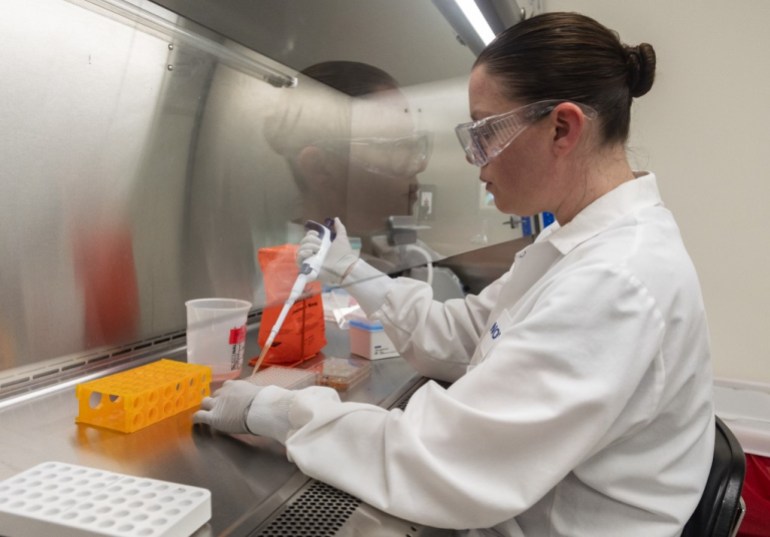Novavax vaccine shows 89 percent efficacy in UK trials
Clinical trial data also shows vaccine nearly as effective in protecting against the more highly contagious variant first discovered in Britain.

Novavax has announced that its coronavirus vaccine was 89.3 percent effective in preventing COVID-19 in a trial conducted in the United Kingdom, and was nearly as effective in protecting against the more highly contagious variant first discovered in the UK, according to a preliminary analysis.
A mid-stage trial of the vaccine in South Africa, where a troubling new variant of the virus has become common, showed 60 percent effectiveness among people who did not have HIV. The United States reported its first cases of the South African variant on Thursday.
Keep reading
list of 3 itemsChange is coming, and at an ever-accelerating pace
Coronavirus vaccine: How will poorer countries get a fair shot?
Novavax, a US-based company, is already stockpiling vaccine at six manufacturing locations, and says it expects a total of eight plants in seven countries to be able to produce the vaccine at a rate of two billion doses per year, including from the Serum Institute of India.
The company stressed that this was interim data and that it would be two to three months before they were ready to apply for authorisation with regulators.
The UK trial, which enrolled 15,000 people aged between 18 and 84, is expected to be used to apply for use in Britain, the European Union and other countries.
Approval of the Novavax vaccine would be welcome in Europe, as it struggles with a lack of supply after Pfizer/BioNTech and AstraZeneca delivered fewer doses than hoped.
Efficacy against mutation
Executives on the call said the company was discussing with the US Food and Drug Administration whether the UK and South Africa data was enough to apply for US emergency use authorisation.
The UK study took place as the more highly transmissible UK variant was circulating.
The preliminary analysis suggests the vaccine was 85.6 percent effective against this mutation, the company announced in its news release. It did not provide detailed data.
In the UK trial, the effectiveness of the vaccine was close to that of the two authorised vaccines from Pfizer BioNTech and Moderna, whose two-dose regimens were both about 95 percent effective at preventing COVID-19 in clinical trials.

‘Spoiled’
Dr Amesh Adalja, an infectious disease expert at the Johns Hopkins Center for Health Security, said the results were in line with expectations, and that he was concerned people would focus too much on the weaker effectiveness shown in South Africa.
“We’ve gotten spoiled because we’ve seen the Moderna and Pfizer numbers. I know people are going to be alarmed, but 60 percent efficacy against the new variant is acceptable,” he said, noting that the FDA initially said it would approve a vaccine that was at least 50 percent effective.
The South African variant has been shown to evade antibody protection in lab studies by Moderna and Pfizer/BioNTech.
Novavax said it started making new versions of its vaccine to protect against emerging virus variants in early January and expects to select ideal candidates for a booster in the coming days. The company said it plans to begin clinical testing of these new vaccines in the second quarter of this year.
A 30,000-person trial in the US and Mexico that began in December is also under way. The company has received $1.6bn from the US government in funding for the vaccine trial and for 100 million doses.
It has also received at least $388m in backing from the Coalition for Epidemic Preparedness Innovation (CEPI), a Norway-based group backed by 14 governments, the Bill and Melinda Gates Foundation, and Britain’s Wellcome Trust.